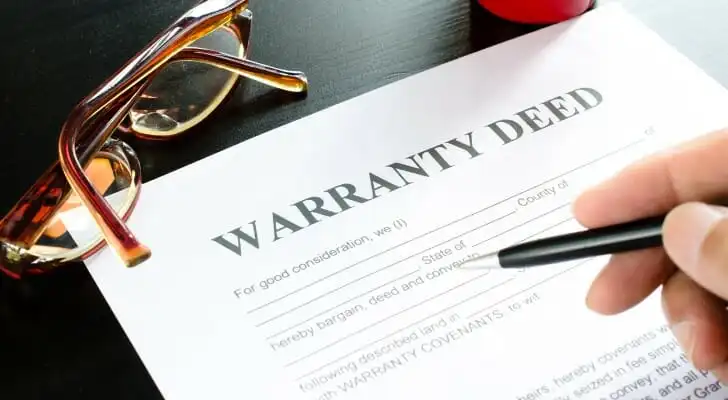 Buying or selling a home usually involves a fair amount of paperwork. A warranty deed is one of the more important documents you may encounter during the process. Warranty deeds are used to verify that there are no obstacles, such as outstanding liens, that could block the transfer of a property from the seller to the buyer. If you’re buying a home from someone you don’t know or selling a home, it’s important to understand how warranty deeds work and when they’re used. Whether or you decide you need a warranty deed or not, a financial advisor can provide excellent advice as you move through the home-buying process.
Buying or selling a home usually involves a fair amount of paperwork. A warranty deed is one of the more important documents you may encounter during the process. Warranty deeds are used to verify that there are no obstacles, such as outstanding liens, that could block the transfer of a property from the seller to the buyer. If you’re buying a home from someone you don’t know or selling a home, it’s important to understand how warranty deeds work and when they’re used. Whether or you decide you need a warranty deed or not, a financial advisor can provide excellent advice as you move through the home-buying process.
Warranty Deed, Definition
Generally speaking, a deed is a legal document that transfers ownership of a property from one person to another. A warranty deed is a specific type of deed that can be used in situations where one person is buying a home from someone else.
Essentially, a warranty deed certifies to the home buyer that the seller owns the title to a property free and clear. In other words, there are no liens against the home, no mortgages outstanding and no other encumbrances that could complicate the transfer of ownership.
How Warranty Deeds Work

A warranty deed is essentially a tool for protecting the buyer when purchasing a home. Warranty deeds may be required as part of the underwriting process when financing a home purchase with a mortgage. You may also need one when purchasing title insurance for the property. Warranty deeds can guarantee several things, which can make the home buying process smoother. For example, a warranty deed can offer assurance that:
- The person selling the home is its legal owner and has the right to transfer the title
- There are no outstanding liens against the property
- No valid third-party claims of ownership exist
Signing a warranty deed essentially creates a binding contract for the buyer and the seller. If a home sale is finalized and problems with the title arise after the fact, the buyer can hold the seller responsible for any financial losses. This usually means filing a lawsuit to prove there was a violation of the warranty deed terms.
There are certain things that need to be disclosed when a warranty deed is created. For example, if the seller still has a mortgage on the property, owes outstanding property taxes or an easement exists those have to be noted in the warranty deed document.
General vs. Limited Warranty Deeds
Warranty deeds can be general or limited. With a general warranty deed, the seller is guaranteeing that there are no issues with the property’s title. A general warranty deed covers the period of time before the current seller purchased the property.
Limited or special warranty deeds apply only to the time period in which the current seller has owned the property. If there were title issues that existed before the current seller purchased the property, a limited or special warranty deed wouldn’t cover them.
Who Needs a Warranty Deed?
In most cases, you’ll need to have a warranty deed in place if you’re the buyer in a real estate transaction and:
- You don’t know the other parties involved in the purchase
- You’re applying for a mortgage to purchase the property in question
- You’ll need title insurance to complete the home’s purchase
Generally speaking, warranty deeds protect the buyer more than the seller. For that reason, home sellers may try to use a limited warranty deed versus a general deed to give themselves a measure of protection if there were issues with the title before they bought the home.
In situations where the property is being transferred between two people who are related, they might use a quitclaim deed instead. This type of deed essentially allows the seller to “quit” his or her interest in the home and transfer its ownership to someone else.
Warranty deeds are just as important to have when buying an investment property as they are for buying a home you plan to use as your principal residence. If you’re purchasing a rental property or a fix-and-flip, finding out that there are title issues after the fact could eat into your returns. Even if you’re paying cash for a rental property versus getting a mortgage, it may be worthwhile to have a warranty deed in place to protect your investment.
How to Get a Warranty Deed

If you’re buying or selling a home and it’s determined that a warranty deed is needed to complete the sale, the process for getting one may depend on where you live. Your real estate agent or closing attorney may be able to help with drafting this document or you might use an online software program to do it yourself. What you’re required to include in a warranty deed can also depend on state laws regarding property transfers. But generally, a warranty deed should specify:
- Who owns the property currently (also referred to as the grantor)
- The name of the person buying the home (also referred to as the grantee)
- A description of the property that’s being transferred
There must also be some type of wording or statement that makes it clear what type of guarantee the grantor is offering with regard to the property title. Specifically, the warranty deed needs to state that the grantor is the legal owner and that no encumbrances exist to challenge their ability to transfer the title to the grantee.
Both the grantor and the grantee would need to sign the warranty deed. Witness signatures may also be required. The document must also be notarized and recorded with the local register of deeds. While the process itself is fairly simple you may want to talk to a real estate attorney about how to properly draft a warranty deed to ensure that it’s legal.
Warranty Deed Disputes
As mentioned, warranty deeds protect the buyer more than the seller. With that in mind, there are different scenarios in which a buyer may have reason to dispute a warranty deed’s terms.
For example, buyers may have grounds for a dispute if:
- They believe a deed has been forged or is otherwise fraudulent
- It’s determined after the home’s purchase that there are competing deeds or titles
- Deed documents are defective or faulty
- An unrecorded deed or lien is later discovered
Title disputes can also occur if someone else lays claim to the property later. For example, say you buy a home from someone who offers a warranty deed. You buy the home, assuming there are no property claims. Unbeknownst to you, the seller had originally left the home to one of their children in their will. That child then comes forward after the seller’s death to challenge the validity of the deed.
In most cases, a warranty deed will trump the terms of a will. But a challenge to the property’s title could create financial and legal headaches you don’t want to have to deal with. Again, talking to a real estate attorney or your real estate agent can help to head off any potential conflicts when executing the purchase of a home.
The Bottom Line
Warranty deeds are something you may need to be familiar with if you plan to buy a home. When a warranty deed is needed, it’s important to follow state laws to the letter when drafting one. This can help with avoiding issues down the line that could otherwise cloud your enjoyment of your new home.
Tips for Investing
- Property taxes in America are collected by local governments and are usually based on the value of a property. The money collected is generally used to support community safety, schools, infrastructure and other public projects. Use SmartAsset’s property tax tools to better understand the average cost of property taxes in your state and county.
- Consider talking to a financial advisor about warranty deeds and when you might need one if you plan to buy or sell a home. If you don’t have a financial advisor yet, finding one doesn’t have to be complicated. SmartAsset’s financial advisor matching tool can help you connect with professional advisors in your local area. If you’re ready, get started now.
Photo credit: ©iStock.com/Wavebreakmedia, ©iStock.com/maybefalse, ©iStock.com/pondsaksit